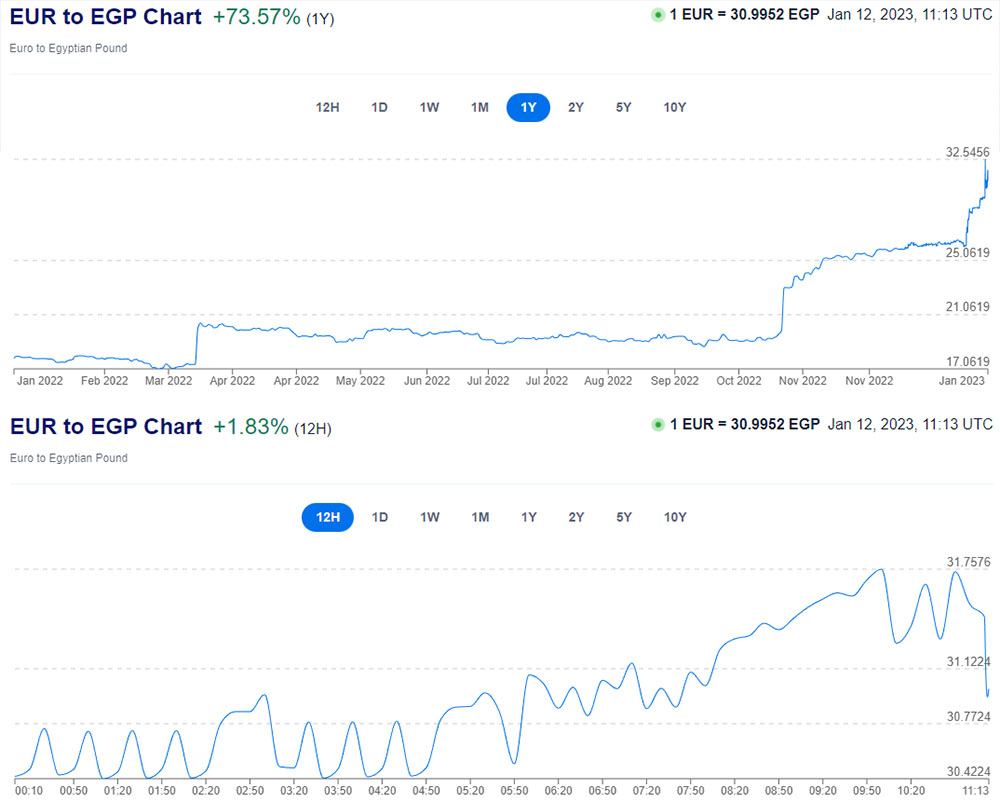
Many dive centres – and other small businesses – in Egypt are suffering devastating financial losses after a massive fall in the value of the Egyptian Pound (LE) in recent months.
The Egyptian Pound was floated – that is, its value made dependent on the supply of, and demand for, the currency – in October 2022, as part of a deal to secure a US$3billion loan from the International Monetary Fund (IMF). The value of the Egyptian Pound has since fallen dramatically, dropping from just over LE17 to 1 Euro at the start of 2022 to more than LE32:€1 by January 11, 2023.
Egypt, one of the world’s largest importers of wheat from Ukraine – one of the world’s largest exporters – has struggled financially since the outbreak of the Russia-Ukraine conflict, which followed swiftly after the huge loss of tourism income during the pandemic.
Since then, soaring global inflation has led to a secondary drop in tourism, of which Russian and Ukrainian tourists made up 30 per cent in 2021, while inflation in Egypt hit 21.9 per cent in December 2022, with food prices rising by up to 37.9 per cent over the year.

Payments made to Egyptian businesses in foreign currencies are automatically converted to Egyptian Pounds by the Egyptian banks that receive them, hence a booking for which €1000 was paid in February 2022 would be worth just over €500 to the dive centre today. Should a customer wish to cancel, refunding that amount would cost the dive centre almost double the payment it initially received.
The problem is further compounded by the fact that Egyptian dive businesses pay significant overheads in Euros for dive equipment and staff. Dive centres are essentially having to pay double the salary for half the earnings for bookings made in 2022.
As of the time of writing, the exchange rate remains extremely volatile – a Cairo businessman was quoted by an AFP reporter saying that he ‘sell[s] at one price in the morning, another in the afternoon, and a third at night.’ In the current global financial climate it is impossible to say when the Egyptian markets will stabilise, with some speculating that there may be another significant fall in the currency before it does.
Some European-owned centres will be less affected by the devaluation of the Egyptian Pound, as their bank accounts are registered in Europe and, therefore, are potentially saving some money on payments they need to make in local currencies.
One solution that may help Egyptian-owned businesses, however, is for customers to pay in stable currencies such as Euros, US Dollars and British Pounds when they visit. Dive centres are understandably hesitant to make such a request for fear they might be implicated in the burgeoning currency black market, but a polite enquiry before travelling and carrying at least partial payment in those currencies may have a significant impact on the survival of some of Egypt’s best dive centres.
- Student diver dies during training dive in Golfo Nuevo, Argentina - 20 February 2026
- New shark-repellent hook could cut longline bycatch by more than 60 per cent - 17 February 2026
- Perth dive operator fined after leaving divers behind - 16 February 2026


